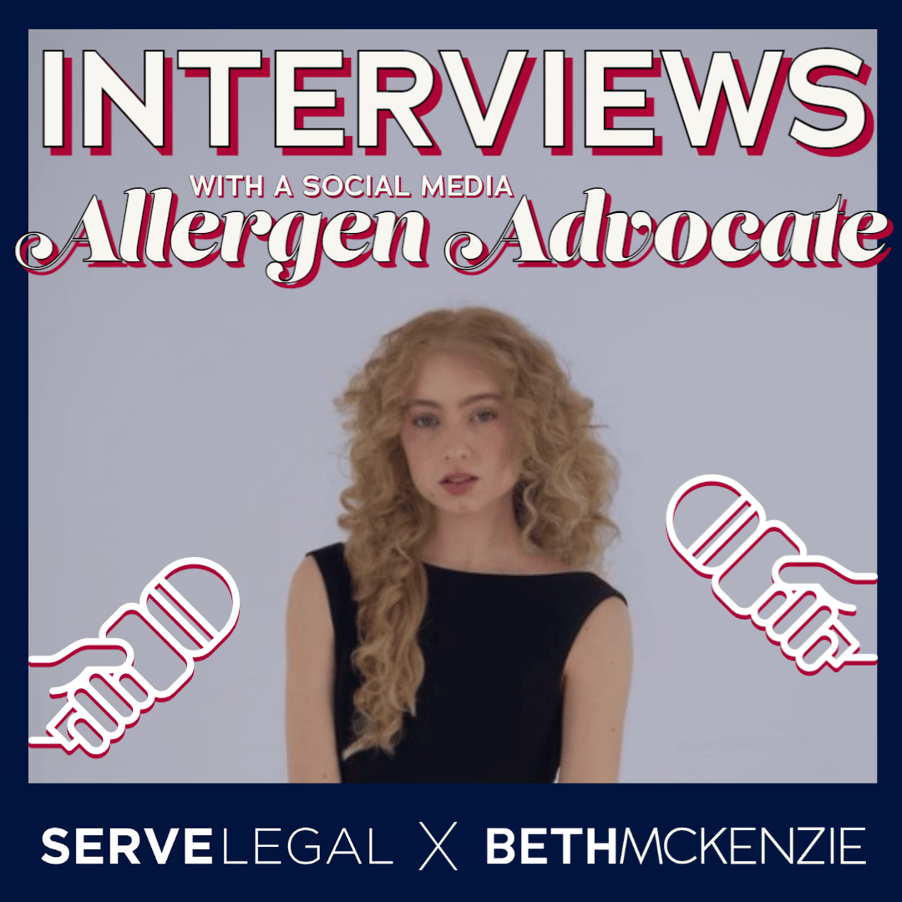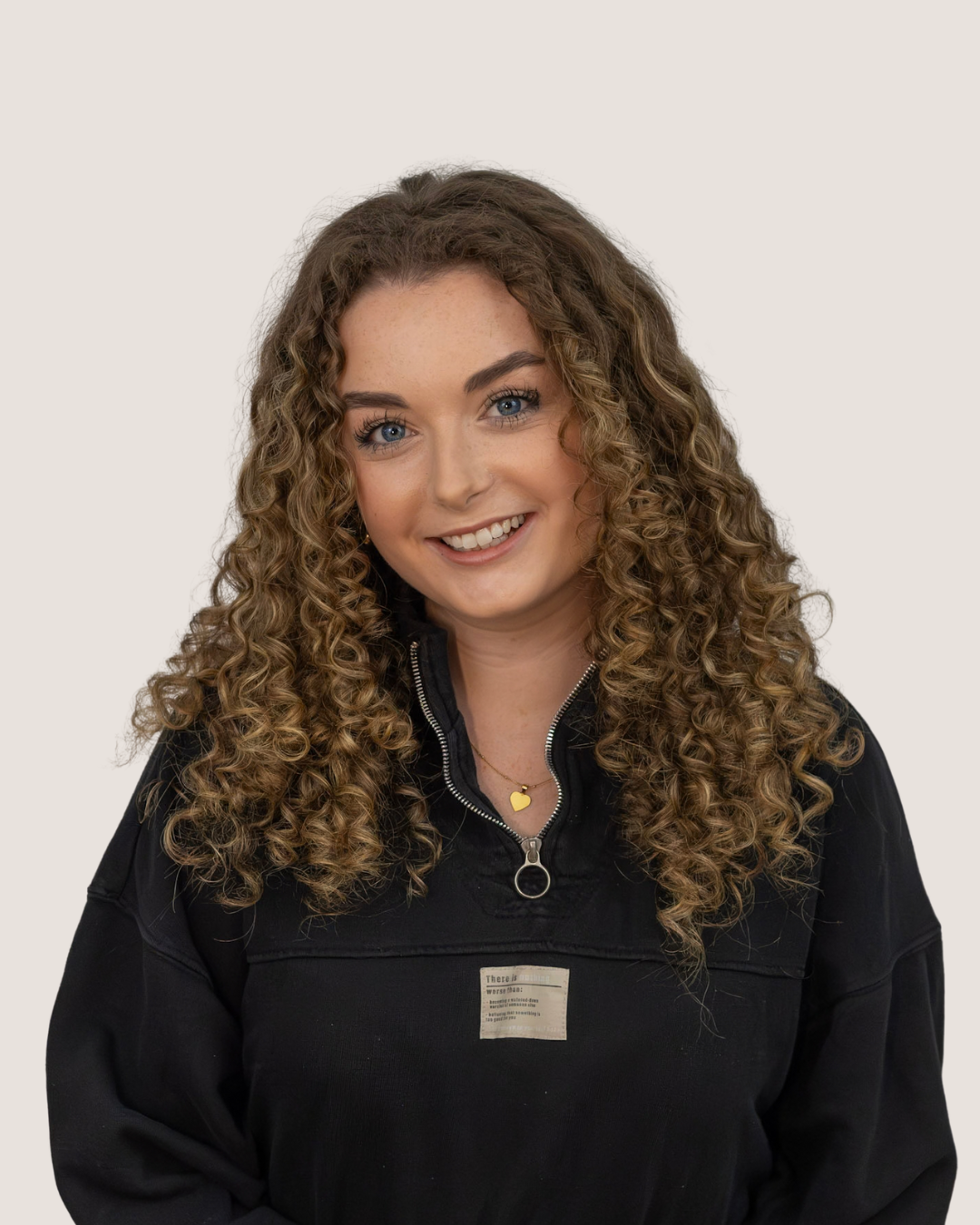At Serve Legal we are passionate in our pursuit to support food-to-go establishments, restaurants and businesses with all matters of allergen compliance and guidance. Our aim is to encourage the implementation of safer legislation and policies to provide a safe space for those who suffer with allergies, to confidently enjoy food outside of the comfort of their own home.
Singer Songwriter and Allergen Advocate, Beth McKenzie, has grown a substantial social media presence through her openness about her struggles with allergy anxiety and the effects of that on her everyday life. In this second and final section of her interview, Beth comments on the ways in which retailers and policy makers can offer support to allergen sufferers, provides some advice to fellow allergen sufferers and explains why she has chosen to partner with Serve Legal.
How can retailers best support allergen sufferers (menus, staff conversation, up to date websites)?
I think what is really important for retailers to do is to educate their staff. You have to remember that the people taking your food orders are often the youngest, most inexperienced employees in the company. When I was 16, my first job was working front of house at a local Italian restaurant. I know most of my friends’ first jobs were also working as a server in both independent and chain eateries. The likelihood of a teenager having the necessary knowledge on allergens without training is low. Now, that's okay when it comes to laying the tables, taking bookings etc. No one is going to die if the knives and forks aren’t properly arranged, but when it comes to dealing with dietary requirements, it is a matter of life and death.
Retailers need to educate ALL of their staff about guidelines and allergen compliance, and make sure that there is a procedure in place for when a customer comes in with an allergy. Otherwise, inexperienced employees working in a fast paced environment will often just brush off a customer’s concerns because they don't know how to deal with it and don’t want to inconvenience their superiors. This is when a situation becomes dangerous for an allergy sufferer - unintentional ignorance is quite literally a silent killer.
How do you think the Owen's Law and Natasha’s Law campaigns are supporting allergen sufferers?
Both Natasha’s Law & Owen’s Law are two incredibly important campaigns and significant pieces of current and proposed legislation: legislation that should have already existed. For those who are unfamiliar with these laws, let me sum them up…
Natasha’s Law states that all food outlets must provide full ingredient lists with clear allergen labelling on 'PPDS' (Prepacked for direct sale) food. PPDS food is a food product that is packaged and sold on site. Natasha Ednan-Laperouse died after eating a sandwich from a sandwich shop - this sandwich contained sesame seeds but this was not stated on the packaging, so Natasha thought that it was safe to eat it. She died soon after.
Owen’s Law is campaigning for a change in the law that compels restaurants to state the allergens in their dishes, specifically on the face of the main menu. This simple change will make unsafe food easy to identify for allergy sufferers when they're eating out. Owen Carey died while celebrating his 18th birthday. The waiter assured Owen and his family that the dish ordered was free of dairy - it wasn’t. Now this was a simple mistake on the part of an inexperienced, under-trained waiter but it cost Owen his life.
These two young people never should have died. There are so many simple things that can be done to prevent these fatalities. It’s upsetting that this needed to happen in order for change to be brought about.
These laws are so important, not only for allergy sufferers, but also for those working in hospitality. These laws protect allergy sufferers from physical harm but their presence also protects our mental health. Personally, the peace of mind I get from a restaurant who can comfortably provide allergy information is such a relief and makes it so much easier to enjoy eating in a social setting.
Natasha fell into anaphylactic shock and died in July 2016. I also had an allergic reaction in July 2016 & my reaction happened in the same way Owen’s did in 2017. So I have been following Natasha’s Law and Owen’s Law very closely for the past 7 years. I cannot stress enough how important it is that campaigns like this are treated with the utmost respect and importance. These two campaigns have saved so many lives in the last few years and will continue to do so in the near and far future.
What do you look for when finding a safe place to eat out?
Personally, I try my best to stick to eating out at chain restaurants. Usually the bigger companies are the ones with better allergy compliance and protocols as they have legal breathing down their necks. It may be cynical of me to think in this way, but a well-known restaurant chain doesn’t want the bad press that comes from a fatal allergic reaction, so by saving their own skin they’re also giving me peace of mind!
My allergic reaction in 2016 was when I was eating out in a very small, yet beautiful, family owned restaurant. While they apologised profusely, they made very little changes to their allergy protocol, purely because they didn’t have the budget. I imagine one day I will feel safe enough to eat in more independent eateries, but I’m just not confident enough yet and have no intention of taking unnecessary risks!
Having seen the Serve Legal allergen compliance trial audit and allergen survey data, is there anything that shocked you?
Honestly, no. The statistics are horrible. 79% of the places that were audited failed due to their insufficient allergy protocols or knowledge. This is a reality that myself and other allergy sufferers expect. Unfortunately, the best way I can think to describe my feelings about these statistics is the cliche phrase ‘disappointed, but not surprised’.
More information on Serve Legal's Allergen Compliance Audits can be found here.
What advice can you offer to allergy sufferers?
Communicate! I cannot stress how vital this is. So many people, including my younger self, avoid informing the people around them about their allergies for different reasons. Whether this is because they’re embarrassed, or don’t want to be an inconvenience or maybe they don’t think it’s relevant in the situation they’re in.
Hiding a potentially fatal medical condition is such an unnecessary risk to take. Regardless of how you perceive yourself and your allergy, most people want to help. They don’t mind if they have to wait an extra five minutes to order, they just want you to be okay!
This leads me onto my next piece of advice… surround yourself with people who take your allergy seriously. If someone is annoyed or embarrassed by your dietary requirement, they’re not someone you want to trust because they clearly make no attempt to understand the severity of your condition.
So please, for the love of God, inform your family, friends, teachers, co-workers & anyone else who needs to know - educate them if you must. So many fatal allergic reactions could have been treated swiftly, or prevented all together, if people were more aware of what was going on.
Why have you chosen to support Serve Legal with their allergy supporting endeavours?
When employees know that someone is coming to assess their work, they will always put on a good show on the day they’re being assessed. This means they’ll do everything by the book, follow all the rules and play it safe. But what happens the next day when they’re no longer being watched? They’ll be more relaxed, they may be happy to cut corners and may make mistakes.
When an eatery is audited by Serve Legal, employees aren’t aware that they’re being watched. This gives the auditor the most realistic experience so they can comment on how things work day to day, not just when the restaurant is being assessed.
By having this unbiased perspective, Serve Legal, who are partnered with Anaphylaxis UK, are able to see the full picture and report back to management truthfully. I think this is a fantastic way to find a starting point and helps construct effective plans to increase allergy awareness.





-1.png)
%201.png)


